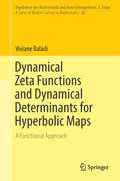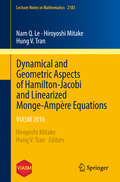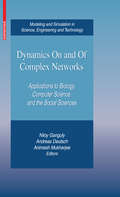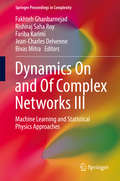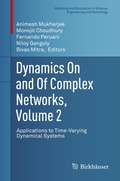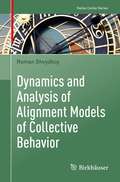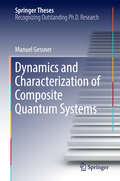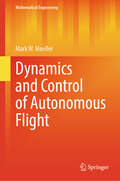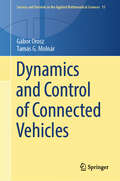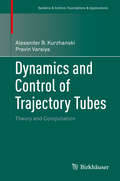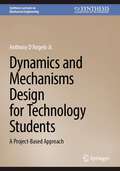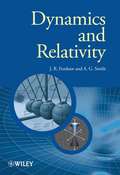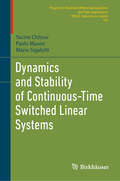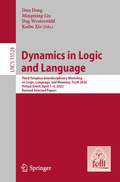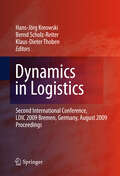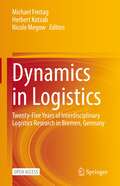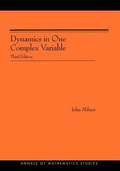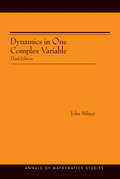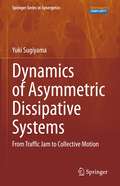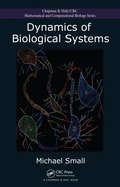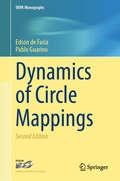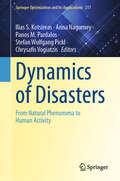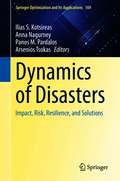- Table View
- List View
Dynamical Zeta Functions and Dynamical Determinants for Hyperbolic Maps: A Functional Approach (Ergebnisse Der Mathematik Und Ihrer Grenzgebiete. 3. Folge / A Series Of Modern Surveys In Mathematics Ser. #68)
by Viviane BaladiThe spectra of transfer operators associated to dynamical systems, when acting on suitable Banach spaces, contain key information about the ergodic properties of the systems. Focusing on expanding and hyperbolic maps, this book gives a self-contained account on the relation between zeroes of dynamical determinants, poles of dynamical zeta functions, and the discrete spectra of the transfer operators. In the hyperbolic case, the first key step consists in constructing a suitable Banach space of anisotropic distributions. The first part of the book is devoted to the easier case of expanding endomorphisms, showing how the (isotropic) function spaces relevant there can be studied via Paley–Littlewood decompositions, and allowing easier access to the construction of the anisotropic spaces which is performed in the second part. This is the first book describing the use of anisotropic spaces in dynamics. Aimed at researchers and graduate students, it presents results and techniques developed since the beginning of the twenty-first century.
Dynamical and Geometric Aspects of Hamilton-Jacobi and Linearized Monge-Ampère Equations: VIASM 2016 (Lecture Notes in Mathematics #2183)
by Nam Q. Le Hiroyoshi Mitake Hung V. TranHiroyoshi Mitake Hung V. TranConsisting of two parts, the first part of this volume is an essentially self-contained exposition of the geometric aspects of local and global regularity theory for the Monge–Ampère and linearized Monge–Ampère equations. As an application, we solve the second boundary value problem of the prescribed affine mean curvature equation, which can be viewed as a coupling of the latter two equations. Of interest in its own right, the linearized Monge–Ampère equation also has deep connections and applications in analysis, fluid mechanics and geometry, including the semi-geostrophic equations in atmospheric flows, the affine maximal surface equation in affine geometry and the problem of finding Kahler metrics of constant scalar curvature in complex geometry. Among other topics, the second part provides a thorough exposition of the large time behavior and discounted approximation of Hamilton–Jacobi equations, which have received much attention in the last two decades, and a new approach to the subject, the nonlinear adjoint method, is introduced. The appendix offers a short introduction to the theory of viscosity solutions of first-order Hamilton–Jacobi equations.
Dynamically Coupled Rigid Body-Fluid Flow Systems
by Banavara N. ShashikanthThis book presents a unified study of dynamically coupled systems involving a rigid body and an ideal fluid flow from the perspective of Lagrangian and Hamiltonian mechanics. It compiles theoretical investigations on the topic of dynamically coupled systems using a framework grounded in Kirchhoff’s equations. The text achieves a balance between geometric mechanics, or the modern theories of reduction of Lagrangian and Hamiltonian systems, and classical fluid mechanics, with a special focus on the applications of these principles. Following an introduction to Kirchhoff’s equations of motion, the book discusses several extensions of Kirchhoff’s work, particularly related to vortices. It addresses the equations of motions of these systems and their Lagrangian and Hamiltonian formulations. The book is suitable to mathematicians, physicists and engineers with a background in Lagrangian and Hamiltonian mechanics and theoretical fluid mechanics. It includes a brief introductory overview of geometric mechanics in the appendix.
Dynamics On and Of Complex Networks
by Animesh Mukherjee Andreas Deutsch Niloy GangulyThis self-contained book systematically explores the statistical dynamics on and of complex networks having relevance across a large number of scientific disciplines. The theories related to complex networks are increasingly being used by researchers for their usefulness in harnessing the most difficult problems of a particular discipline. The book is a collection of surveys and cutting-edge research contributions exploring the interdisciplinary relationship of dynamics on and of complex networks. Topics covered include complex networks found in nature--genetic pathways, ecological networks, linguistic systems, and social systems--as well as man-made systems such as the World Wide Web and peer-to-peer networks. The contributed chapters in this volume are intended to promote cross-fertilization in several research areas, and will be valuable to newcomers in the field, experienced researchers, practitioners, and graduate students interested in systems exhibiting an underlying complex network structure in disciplines such as computer science, biology, statistical physics, nonlinear dynamics, linguistics, and the social sciences.
Dynamics On and Of Complex Networks III: Machine Learning and Statistical Physics Approaches (Springer Proceedings in Complexity)
by Bivas Mitra Fakhteh Ghanbarnejad Rishiraj Saha Roy Fariba Karimi Jean-Charles DelvenneThis book bridges the gap between advances in the communities of computer science and physics--namely machine learning and statistical physics. It contains diverse but relevant topics in statistical physics, complex systems, network theory, and machine learning. Examples of such topics are: predicting missing links, higher-order generative modeling of networks, inferring network structure by tracking the evolution and dynamics of digital traces, recommender systems, and diffusion processes.The book contains extended versions of high-quality submissions received at the workshop, Dynamics On and Of Complex Networks (doocn.org), together with new invited contributions. The chapters will benefit a diverse community of researchers. The book is suitable for graduate students, postdoctoral researchers and professors of various disciplines including sociology, physics, mathematics, and computer science.
Dynamics On and Of Complex Networks, Volume 2: Applications to Time-Varying Dynamical Systems
by Animesh Mukherjee Niloy Ganguly Bivas Mitra Fernando Peruani Monojit ChoudhuryThis self-contained book systematically explores the statistical dynamics on and of complex networks with a special focus on time-varying networks. In the constantly changing modern world, there is an urgent need to understand problems related to systems that dynamically evolve in either structure or function, or both. This work is an attempt to address such problems in the framework of complex networks. Dynamics on and of Complex Networks, Volume 2: Applications to Time-Varying Dynamical Systems is a collection of surveys and cutting-edge research contributions exploring key issues, challenges, and characteristics of dynamical networks that emerge in various complex systems. Toward this goal, the work is thematically organized into three main sections with the primary thrust on time-varying networks: Part I studies social dynamics; Part II focuses on community identification; and Part III illustrates diffusion processes. The contributed chapters in this volume are intended to promote cross-fertilization in several research areas and will be valuable to newcomers in the field, experienced researchers, practitioners, and graduate students interested in pursuing research in dynamical networks with applications to computer science, statistical physics, nonlinear dynamics, linguistics, and the social sciences. This volume follows Dynamics On and Of Complex Networks: Applications to Biology, Computer Science, and the Social Sciences (2009), ISBN 978-0-8176-4750-6.
Dynamics and Analysis of Alignment Models of Collective Behavior (Nečas Center Series)
by Roman ShvydkoyThis book introduces a class of alignment models based on the so-called Cucker-Smale system as well as its kinetic and hydrodynamic counterparts. Cutting edge research in the area of collective behavior is presented, including emerging techniques from fluid mechanics, fractional analysis, and kinetic theory. Analytical aspects are highlighted throughout, such as regularity theory and long time behavior of solutions. Featuring open problems, readers will be motivated to apply these breakthrough methods to future research. The chapters offer an overview of state of the art research with introductions to core concepts. Chapter One introduces the central focus of the book: The agent-based Cucker-Smale system. Further agent-based systems and alignment systems are covered in chapters Two and Three. Following this are chapters covering the kinetic and hydrodynamic variants of the Cucker-Smale system. The core well-posedness theory of both smooth and singular models is then presented. Chapter Eight discusses the fully developed one-dimensional theory. The final chapter presents some of the known partial results concerning the regularity of multidimensional Euler Alignment systems. Dynamics and Analysis of Alignment Models of Collective Behavior is ideal for graduate students and researchers studying PDEs, especially those interested in the active areas of collective behavior and alignment models.
Dynamics and Analytic Number Theory
by Dzmitry Badziahin Alexander Gorodnik Norbert PeyerimhoffWritten by leading experts, this book explores several directions of current research at the interface between dynamics and analytic number theory. Topics include Diophantine approximation, exponential sums, Ramsey theory, ergodic theory and homogeneous dynamics. The origins of this material lie in the 'Dynamics and Analytic Number Theory' Easter School held at Durham University in 2014. Key concepts, cutting-edge results, and modern techniques that play an essential role in contemporary research are presented in a manner accessible to young researchers, including PhD students. This book will also be useful for established mathematicians. The areas discussed include ubiquitous systems and Cantor-type sets in Diophantine approximation, flows on nilmanifolds and their connections with exponential sums, multiple recurrence and Ramsey theory, counting and equidistribution problems in homogeneous dynamics, and applications of thin groups in number theory. Both dynamical and 'classical' approaches towards number theoretical problems are also provided.
Dynamics and Characterization of Composite Quantum Systems
by Manuel GessnerThis thesis sheds new light on the fascinating properties of composite quantum systems. Quantum systems of different sizes, ranging from small bipartite systems to large many-body ensembles, can be studied with the help of modern quantum optical experiments. These experiments make it possible to observe a broad variety of striking features, including nonclassical correlations, complex dynamics and quantum phase transitions. By adopting the complementary perspectives of quantum information theory, quantum chemistry and many-body theory, the thesis develops new methods for the efficient characterization and description of interacting, composite quantum systems.
Dynamics and Control of Autonomous Flight (Mathematical Engineering)
by Mark W. MuellerThis book provides a solid foundation to the exciting world of aerial autonomy, with a focus on their rigid-body dynamics, sensing and state estimation, and low-level stabilization. It discusses low-speed, propeller-driven flight typical of Uncrewed Aerial Systems. A tensor approach to 3D modelling allows for a very general modelling approach, which is then also translated into easy-to-use equations (e.g., for coding a state estimator). Stability theory and simple control approaches are developed from first principles, and again applied to, and illustrated with, examples in flight. Concepts central to the practising aerospace engineer, such as rotation formalisms (rotation matrix, quaternions) and the dynamics of rotation are treated in depth. The book is aimed at those interested in aerial autonomy or robotics and requires only fundamental mathematical background in linear algebra and differential equations. Problems are provided throughout the text to evaluate knowledge.
Dynamics and Control of Connected Vehicles (Surveys and Tutorials in the Applied Mathematical Sciences #15)
by Gábor Orosz Tamás G. MolnárThis book explores the dynamics, stability, and control of connected vehicles, offering a deep dive into how vehicle networks and traffic flows are influenced by automation and connectivity. Blending theory and application, it is ideal for readers with interests in dynamical systems, control theory, and time delay systems, as well as practitioners and researchers working on vehicle dynamics, traffic modeling, and connected and automated vehicle technologies. A foundational understanding of linear control systems, differential equations, and transfer functions is recommended for readers. Structured across five insightful chapters: Chapter 1 introduces the topic and positions it within the current body of research. Chapter 2 analyzes human driver behavior and the stability of traffic involving human-driven vehicles. Chapter 3 focuses on longitudinal control in automated vehicles, including cruise and adaptive cruise control. Chapter 4 examines how vehicle-to-everything (V2X) communication enhances control strategies and enables networked vehicle coordination. Chapter 5 presents real-world experimental results using connected cruise control in mixed traffic environments. Whether you are an academic, engineer, or researcher, this book offers a comprehensive and up-to-date perspective on one of the most transformative areas in modern transportation.
Dynamics and Control of Trajectory Tubes
by Alexander B. Kurzhanski Pravin VaraiyaThis monograph presents theoretical methods involving the Hamilton-Jacobi-Bellman formalism in conjunction with set-valued techniques of nonlinear analysis to solve significant problems in dynamics and control. The emphasis is on issues of reachability, feedback control synthesis under complex state constraints, hard or double bounds on controls, and performance in finite time. Guaranteed state estimation, output feedback control, and hybrid dynamics are also discussed. Although the focus is on systems with linear structure, the authors indicate how to apply each approach to nonlinear and nonconvex systems. The main theoretical results lead to computational schemes based on extensions of ellipsoidal calculus that provide complete solutions to the problems. These computational schemes in turn yield software tools that can be applied effectively to high-dimensional systems. Ellipsoidal Techniques for Problems of Dynamics and Control: Theory and Computation will interest graduate and senior undergraduate students, as well as researchers and practitioners interested in control theory, its applications, and its computational realizations.
Dynamics and Mechanisms Design for Technology Students: A Project-Based Approach (Synthesis Lectures on Mechanical Engineering)
by Anthony D´Angelo Jr.The book reviews the algebra, trigonometry, and basic calculus students need to be successful in solving problems. Next, a review of kinematics and Newton’s laws are discussed, and numerous examples are solved. Mechanisms include the slider crank, offset slider crank, gears and gear trains, belts and chains, and cams. A graphical and analytical approach is taken when covering slider crank mechanisms. The book uses vectors and Kennedy's theorem to solve a variety of included examples. Gears and gear trains as well as belts and chains are discussed. Finally, cams using graphical and analytical techniques are introduced. The concluding chapter gives multiple projects used in the class to capture the lectures and computer modeling using Excel and MATLAB.
Dynamics and Relativity
by Jeffrey Forshaw Gavin SmithA new title in the Manchester Physics Series, this introductory text emphasises physical principles behind classical mechanics and relativity. It assumes little in the way of prior knowledge, introducing relevant mathematics and carefully developing it within a physics context. Designed to provide a logical development of the subject, the book is divided into four sections, introductory material on dynamics, and special relativity, which is then followed by more advanced coverage of dynamics and special relativity. Each chapter includes problems ranging in difficulty from simple to challenging with?solutions for solving problems. Includes?solutions for solving problemsNumerous worked examples included throughout the bookMathematics is carefully explained and developed within a physics environmentSensitive to topics that can appear daunting or confusing
Dynamics and Stability of Continuous-Time Switched Linear Systems (Progress in Nonlinear Differential Equations and Their Applications #105)
by Mario Sigalotti Yacine Chitour Paolo MasonLinear switched systems are a fascinating field of research, with many theoretical questions arising from applications which require sophisticated mathematical tools for their resolution. This monograph presents a unified theoretical approach for the analysis of stability of continuous-time linear switched systems, organizing and optimizing results scattered throughout literature. Emphasis is placed on the development of a rigorous and complete mathematical theory. In addition to fundamental tools such as common Lyapunov functions, converse Lyapunov theorems, and maximal Lyapunov exponents, the concept of Barabanov norm is also discussed. While this is now well understood from a theoretical point of view, it has not received much attention in more application-focused settings, likely because this fundamental object was developed in the context of arbitrary switches but has no immediate equivalent for classes of switching signals subject to various constraints (dwell time, persistent excitation, etc.). One of the aims of this text is to bridge this gap as far as possible by explaining how the main features of Barabanov norms can be generalized for classes of constrained switchings. Throughout the text, the authors maintain a general point of view, rather than treating classes of switching signals separately, by developing an axiomatic approach and identifying structural properties of these classes that allow crucial aspects of the Barabanov norm to be extended. This monograph will be a valuable resource for mathematicians and control engineers interested in continuous-time switched linear systems, as well as a definitive reference for more experienced researchers.
Dynamics in Logic and Language: Third Tsinghua Interdisciplinary Workshop on Logic, Language, and Meaning, TLLM 2022, Virtual Event, April 1–4, 2022, Revised Selected Papers (Lecture Notes in Computer Science #13524)
by Mingming Liu Dun Deng Dag Westerståhl Kaibo XieEdited in collaboration with FoLLI, the Association of Logic, Language and Information, this book constitutes the refereed proceedings of the Third Tsinghua Interdisciplinary Workshop on Logic, Language, and Meaning, TLLM 2022, which was held virtually in April 2022.The 9 full papers presented in this volume were carefully reviewed and selected from 13 submissions. The workshop covers a wide range of topics such as dynamic semantics, logical dynamics, Dynamic Epistemic Logic, Discourse Representation Theory, formal semantics, free choice inference, update semantics, and donkey sentences.
Dynamics in Logistics
by Bernd Scholz-Reiter Hans-Jörg Kreowski Klaus-Dieter ThobenThe volume comprises the proceedings of the third International Conference on Dynamics in Logistics LDIC 2012. The scope of the conference targeted the identification, analysis, and description of the dynamics of logistic processes and networks. The spectrum ranged from the modeling and planning of processes and innovative methods like autonomous control and knowledge management to the new technologies provided by radio frequency identification, mobile communication, and networking. The growing dynamics in the area of logistics poses completely new challenges: Logistic processes and networks must rapidly and flexibly adapt to continuously changing conditions. LDIC 2012 provided a venue for researchers from academia and industry interested in the technical advances in dynamics in logistics. The conference addressed research in logistics from a wide range of fields, e.g. engineering, computer science and operations research. The volume consists of two invited papers and of 49 contributed papers divided into various subjects including transport logistics, routing in dynamic logistic networks, modeling, simulation, optimization and collaboration in logistics, identification technologies, mathematical modeling in transport and production logistics, information, communication, risk and failure in logistic systems, autonomous control in logistic processes, global supply chains and industrial applications, and the Internet of Things in the context of logistics.
Dynamics in Logistics: Twenty-Five Years of Interdisciplinary Logistics Research in Bremen, Germany
by Herbert Kotzab Michael Freitag Nicole MegowThis open access book highlights the interdisciplinary aspects of logistics research. Featuring empirical, methodological, and practice-oriented articles, it addresses the modelling, planning, optimization and control of processes. Chiefly focusing on supply chains, logistics networks, production systems, and systems and facilities for material flows, the respective contributions combine research on classical supply chain management, digitalized business processes, production engineering, electrical engineering, computer science and mathematical optimization. To celebrate 25 years of interdisciplinary and collaborative research conducted at the Bremen Research Cluster for Dynamics in Logistics (LogDynamics), in this book hand-picked experts currently or formerly affiliated with the Cluster provide retrospectives, present cutting-edge research, and outline future research directions.
Dynamics in One Complex Variable
by John MilnorThis volume studies the dynamics of iterated holomorphic mappings from a Riemann surface to itself, concentrating on the classical case of rational maps of the Riemann sphere. This subject is large and rapidly growing. These lectures are intended to introduce some key ideas in the field, and to form a basis for further study. The reader is assumed to be familiar with the rudiments of complex variable theory and of two-dimensional differential geometry, as well as some basic topics from topology. This third edition contains a number of minor additions and improvements: A historical survey has been added, the definition of Latt#xC3;#xA9;s map has been made more inclusive, and the #xC3;0calle-Voronin theory of parabolic points is described. The r#xC3;#xA9;sidu it#xC3;#xA9;ratif is studied, and the material on two complex variables has been expanded. Recent results on effective computability have been added, and the references have been expanded and updated. Written in his usual brilliant style, the author makes difficult mathematics look easy. This book is a very accessible source for much of what has been accomplished in the field.
Dynamics in One Complex Variable. (AM-160): (AM-160)
by John MilnorThis volume studies the dynamics of iterated holomorphic mappings from a Riemann surface to itself, concentrating on the classical case of rational maps of the Riemann sphere. This subject is large and rapidly growing. These lectures are intended to introduce some key ideas in the field, and to form a basis for further study. The reader is assumed to be familiar with the rudiments of complex variable theory and of two-dimensional differential geometry, as well as some basic topics from topology. This third edition contains a number of minor additions and improvements: A historical survey has been added, the definition of Lattés map has been made more inclusive, and the écalle-Voronin theory of parabolic points is described. The résidu itératif is studied, and the material on two complex variables has been expanded. Recent results on effective computability have been added, and the references have been expanded and updated. Written in his usual brilliant style, the author makes difficult mathematics look easy. This book is a very accessible source for much of what has been accomplished in the field.
Dynamics of Asymmetric Dissipative Systems: From Traffic Jam to Collective Motion (Springer Series in Synergetics)
by Yuki SugiyamaThis book provides the dynamics of non-equilibrium dissipative systems with asymmetric interactions (Asymmetric Dissipative System; ADS). Asymmetric interaction breaks "the law of action and reaction" in mechanics, and results in non-conservation of the total momentum and energy. In such many-particle systems, the inflow of energy is provided and the energy flows out as dissipation. The emergences of non-trivial macroscopic phenomena occur in the non-equilibrium energy balance owing to the effect of collective motions as phase transitions and bifurcations. ADS are applied to the systems of self-driven interacting particles such as traffic and granular flows, pedestrians and evacuations, and collective movement of living systems. The fundamental aspects of dynamics in ADS are completely presented by a minimal mathematical model, the Optimal Velocity (OV) Model. Using that model, the basics of mathematical and physical mechanisms of ADS are described analytically with exact results. The application of 1-dimensional motions is presented for traffic jam formation. The mathematical theory is compared with empirical data of experiments and observations on highways. In 2-dimensional motion pattern formations of granular media, pedestrians, and group formations of organisms are described. The common characteristics of emerged moving objects are a variety of patterns, flexible deformations, and rapid response against stimulus. Self-organization and adaptation in group formations and control of group motions are shown in examples. Another OV Model formulated by a delay differential equation is provided with exact solutions using elliptic functions. The relations to soliton systems are described. Moreover, several topics in ADS are presented such as the similarity between the spatiotemporal patterns, violation of fluctuation dissipation relation, and a thermodynamic function for governing the phase transition in non-equilibrium stationary states.
Dynamics of Biological Systems (Chapman & Hall/CRC Computational Biology Series)
by Michael SmallFrom the spontaneous rapid firing of cortical neurons to the spatial diffusion of disease epidemics, biological systems exhibit rich dynamic behaviour over a vast range of time and space scales. Unifying many of these diverse phenomena, Dynamics of Biological Systems provides the computational and mathematical platform from which to understand the
Dynamics of Circle Mappings (IMPA Monographs)
by Pablo Guarino Edson de FariaThis book explores recent developments in the dynamics of invertible circle maps, a rich and captivating topic in one-dimensional dynamics. It focuses on two main classes of invertible dynamical systems on the circle: global diffeomorphisms and smooth homeomorphisms with critical points. The latter is the book's core, reflecting the authors' recent research interests.Organized into four parts and 14 chapters, the content covers rigid rotations, circle homeomorphisms, and the concept of rotation number in the first part. The second part delves into circle diffeomorphisms, presenting classical results. The third part introduces multicritical circle maps—smooth homeomorphisms of the circle with a finite number of critical points. The fourth and final part centers on renormalization theory, analyzing the fine geometric structure of orbits of multicritical circle maps. Complete proofs for several fundamental results in circle dynamics are provided throughout. The book concludes with a list of open questions.Primarily intended for graduate students and young researchers in dynamical systems, this book is also suitable for mathematicians from other fields with an interest in the subject. Prerequisites include familiarity with the content of a standard graduate course in real analysis, along with some understanding of ergodic theory and dynamical systems. Basic knowledge of complex analysis is needed for specific chapters.
Dynamics of Disasters: From Natural Phenomena to Human Activity (Springer Optimization and Its Applications #217)
by Panos M. Pardalos Ilias S. Kotsireas Anna Nagurney Chrysafis Vogiatzis Stefan Wolfgang PicklBased on the “Sixth International Conference on Dynamics of Disasters” (Piraeus, Greece, July 2023), this volume includes contributions from experts who share their latest discoveries on disasters either caused by natural phenomena or human activities. Authors provide overviews of the tactical points involved in disaster relief, outlines of hurdles from mitigation and preparedness to response and recovery and uses for mathematical models to describe disasters and their impacts. This volume includes additional invited manuscripts from other experts and leaders in the field. Topics covered include economics, optimization, machine learning, government, management, business, humanities, engineering, medicine, mathematics, computer science, behavioral studies, emergency services, and environmental studies and will engage readers from a wide variety of fields and backgrounds.
Dynamics of Disasters: Impact, Risk, Resilience, and Solutions (Springer Optimization and Its Applications #169)
by Panos M. Pardalos Ilias S. Kotsireas Anna Nagurney Arsenios TsokasBased on the “Fourth International Conference on Dynamics of Disasters” (Kalamata, Greece, July 2019), this volume includes contributions from experts who share their latest discoveries on natural and unnatural disasters. Authors provide overviews of the tactical points involved in disaster relief, outlines of hurdles from mitigation and preparedness to response and recovery, and uses for mathematical models to describe natural and man-made disasters. Topics covered include economics, optimization, machine learning, government, management, business, humanities, engineering, medicine, mathematics, computer science, behavioral studies, emergency services, and environmental studies will engage readers from a wide variety of fields and backgrounds.
